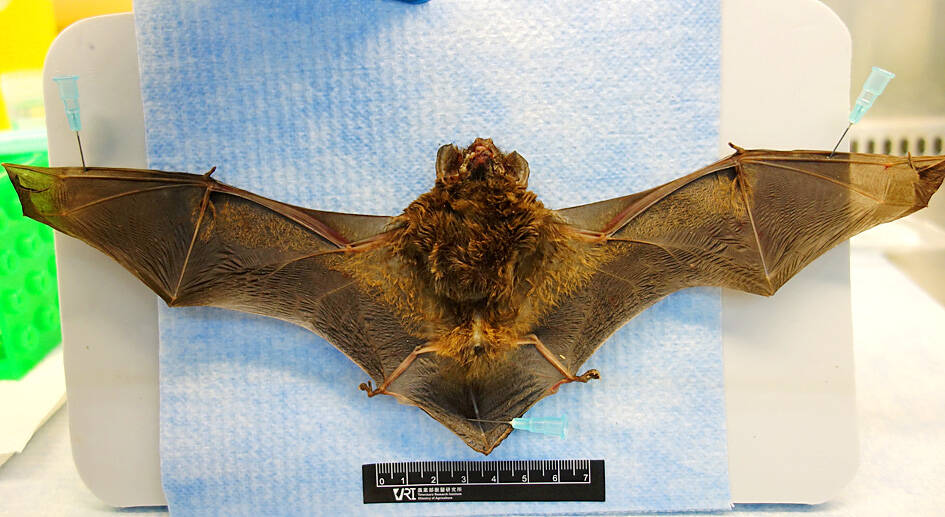The Bureau of Animal and Plant Health Inspection and Quarantine last week warned the public not to touch wild animals after the Veterinary Research Institute found type-2 Lyssavirus in a Chinese noctule bat that flew into a residence in Jhonghe District (中和) last month.
While Lyssavirus is not defined as an infectious disease in Taiwan, it is still dangerous as it is transmissible to humans, the bureau said.
There are 17 types of Lyssavirus, including rabies, the bureau said, adding that type-2 Lyssavirus is unrelated to rabies and similar to the Lyssavirus found in Chinese Noctule bats in 2018.

Photo courtesy of the Center Disease and Control
It had found type-1 Lyssavirus on four Japanese houseboats between 2016 and 2022, it said.
The bureau said that bats are natural Lyssavirus hosts. If people sees bats on the road, they should not touch them, but instead alert a local animal quarantine office or other bat conservation groups.
Bureau deputy director-general Hsu Jung-pin (徐榮彬) said Lyssavirus is transmitted neurally and the public should avoid situations that put them at risk of being bitten.
However, if they are bitten they should visit a hospital immediately and ask to be given a rabies vaccine, he added.
Centers of Disease and Control (CDC) spokesperson Tseng Shu-hui (曾淑慧) said the individual who found the bat had not been bitten, and after an assessment, the CDC deemed them to not be at risk.
Tseng urged members of the public not to touch or capture wild animals, and if they are pet owners, to take their pets to a veterinarian for their annual rabies shot.
She said that if members of the public have been scratched or bitten by wild animals, they should clean the wound with soap and large amounts of fresh water for 15 minutes and sanitize the wound with hydrogen peroxide or 70 percent-proof alcohol.
After cleansing the wound, they should visit a hospital or a local health center to receive a rabies vaccine.

The High Prosecutors’ Office yesterday withdrew an appeal against the acquittal of a former bank manager 22 years after his death, marking Taiwan’s first instance of prosecutors rendering posthumous justice to a wrongfully convicted defendant. Chu Ching-en (諸慶恩) — formerly a manager at the Taipei branch of BNP Paribas — was in 1999 accused by Weng Mao-chung (翁茂鍾), then-president of Chia Her Industrial Co, of forging a request for a fixed deposit of US$10 million by I-Hwa Industrial Co, a subsidiary of Chia Her, which was used as collateral. Chu was ruled not guilty in the first trial, but was found guilty

‘DENIAL DEFENSE’: The US would increase its military presence with uncrewed ships, and submarines, while boosting defense in the Indo-Pacific, a Pete Hegseth memo said The US is reorienting its military strategy to focus primarily on deterring a potential Chinese invasion of Taiwan, a memo signed by US Secretary of Defense Pete Hegseth showed. The memo also called on Taiwan to increase its defense spending. The document, known as the “Interim National Defense Strategic Guidance,” was distributed this month and detailed the national defense plans of US President Donald Trump’s administration, an article in the Washington Post said on Saturday. It outlines how the US can prepare for a potential war with China and defend itself from threats in the “near abroad,” including Greenland and the Panama

DEADLOCK: As the commission is unable to forum a quorum to review license renewal applications, the channel operators are not at fault and can air past their license date The National Communications Commission (NCC) yesterday said that the Public Television Service (PTS) and 36 other television and radio broadcasters could continue airing, despite the commission’s inability to meet a quorum to review their license renewal applications. The licenses of PTS and the other channels are set to expire between this month and June. The National Communications Commission Organization Act (國家通訊傳播委員會組織法) stipulates that the commission must meet the mandated quorum of four to hold a valid meeting. The seven-member commission currently has only three commissioners. “We have informed the channel operators of the progress we have made in reviewing their license renewal applications, and

A wild live dugong was found in Taiwan for the first time in 88 years, after it was accidentally caught by a fisher’s net on Tuesday in Yilan County’s Fenniaolin (粉鳥林). This is the first sighting of the species in Taiwan since 1937, having already been considered “extinct” in the country and considered as “vulnerable” by the International Union for Conservation of Nature. A fisher surnamed Chen (陳) went to Fenniaolin to collect the fish in his netting, but instead caught a 3m long, 500kg dugong. The fisher released the animal back into the wild, not realizing it was an endangered species at